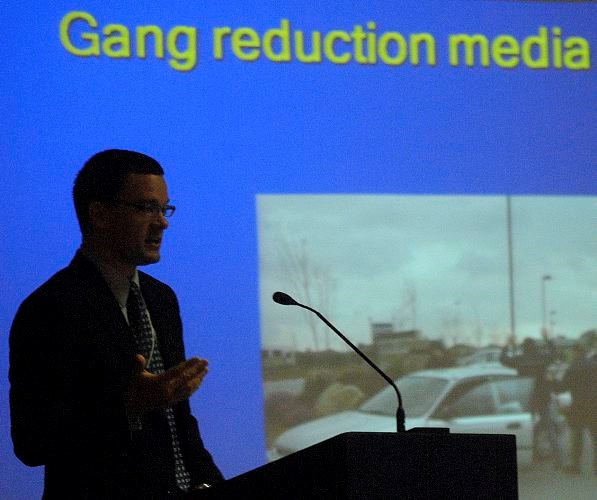Addicts, the most common foot soldier in the organized crime army, are the biggest threat to the public.
According to RCMP Insp. Tim Shields, who has won awards for his work depicting the realities of drugs and gangs, the primary symptoms of gang proliferation are the car thefts, the break-and-enters, the robberies, the prostitution, and the broken families that come from drug addiction.
However, not only can these criminals be captured and sent to jail, he said, they can also be turned around and become productive members of our family and community again.
Shields showed interviews he did with two such B.C. criminals - both could be described as punk kids, thuggish Caucasian youths - to the audience at the Community Solutions-Gang Crime Summit held this week at The Ramada.
"This guy is a hellion. His community considered him the number one hellion in their town," Shields said. The kid was an addict, a petty crook, and thought nothing of breaking into cars and houses to get money for his next fix. Yet, while describing his lifestyle, gave in to sobs as he talked about how he had disappointed his father. "Deep down inside he has the same hopes and aspirations as the rest of us. He just wants his dad to be proud of him. But he smoked crystal meth and from the time that smoke first hit his lungs he knew he was hooked."
The other youth admitted to breaking into cars for fun, sometimes 25 or 30 a day. This often brought police attention, and that created a volatile public danger.
"He is willing to kill someone to get away," Shields said, echoing the kid's descriptions of high-speed reckless pursuits. "I would say that poses even more of a danger to the public than the ones actually in gangs, because of what he is willing to do to get away."
That youth even had some advise for the courts, after he realized each time he was arrested he would simply be cut loose on a promise to appear later at a court meeting.
"I don't think it's right. I don't think someone should be released on bail, on recognizance, so many times. That's retarded," he said into the camera.
No one argued from among the audience of 200-or-so community leaders and activists.
Arresting these people can happen, said Shields, but until something is done with them by the courts, by social intervention agencies, by educators, by anyone who has contact with the issue of public development, those addicts are just going to revolve right back out into the theatre of crime, and it is only a matter of time before it's your car or your home or your wallet that gets ripped off, or your family member that winds up addicted too.
"There is no golden key," he said. "It's like finding the cure for cancer. We all want so desperately to find it, but the best treatments are when everyone contributes a little bit, and we get success together."



